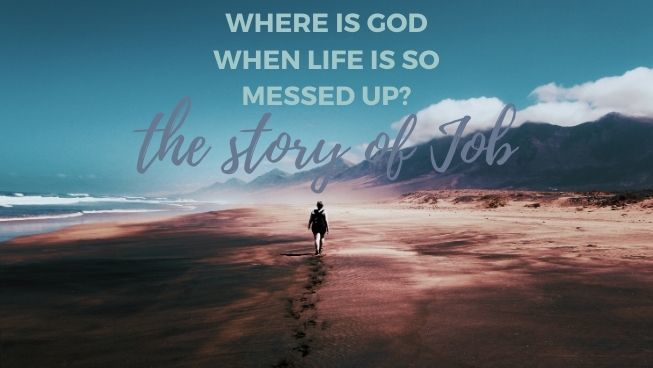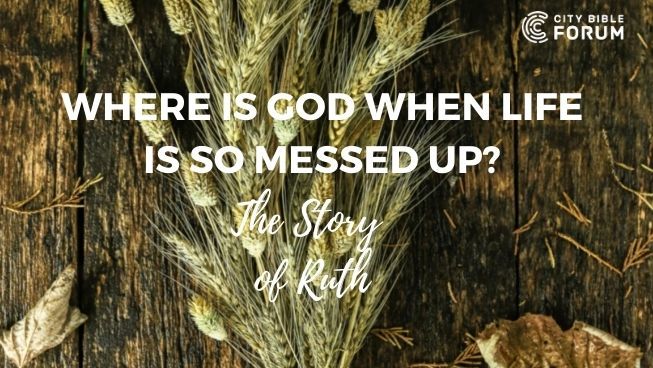If God is real, why doesn't he make himself more obvious?

Anyone who has believed in God for any extended period of time shares something in common. Disappointment. At some point we ask ourselves: Why don’t I feel my faith anymore? Why do I feel so lonely if God with me? Why hasn’t my life turned out how I hoped? Even King David cries to God, “Why, Lord, do you stand far off? Why do you hide yourself in times of trouble? (Psalm 10:1)
It seems having a relationship with an all-powerful and all-good God isn’t always what we imagined it would be. Why can’t we feel God when we seem to need Him most? Why does He hide from us?
In search of answers to this question, let’s explore just three biblical scenes: The Garden of Eden in Genesis, Gethsemane and Golgotha in the Gospels, and the Garden City in Revelation. In looking at these scenes, perhaps we will see that God’s hiddenness isn’t a sign that He doesn’t love us. Instead, God hides precisely because He loves us. His presence and His absence are intentional acts of a God who is so big and so good that only He knows when and how we need to experience His presence.
Scene 1: The Garden of Eden in Genesis
The Bible begins with a powerful friendship between God and humans. Our first parents Adam and Eve were said to have walked with God in Eden’s garden. We were made for God’s presence. For intimacy. To talk with God face to face.
But in Genesis chapter 3, humans sinned. We traded our friendship with God for an illicit pleasure. We fell from our high calling as God’s image bearers and became broken. Where once humans could be completely open before God and each other without feeling shame, now the story describes how we began to hide behind fig leaves and ferns.
Where once humans could be completely open before God and each other without feeling shame, now the story describes how we began to hide behind fig leaves and ferns.
Humanity started hiding long before God ever felt distant.
And in reaction to human sin, God hides as well. No longer would He walk with us in the cool of the evening. But why? The complex answer is that it is both for our punishment and protection.
Separation from God’s light and life and love is part of sin’s penalty. And it’s a penalty that leads to death. But God hiding is also an act of protection, mercy, and hope.
God’s holiness is like the sun. A ball of raw energy. Anything that isn’t already like the sun and tries to approach, is destroyed. Which is precisely why the Bible speaks of God as a consuming fire (Hebrews 12:29), or as living in unapproachable light (1 Timothy 6:16). No one can, in sinful flesh, stand in God’s actual presence without being killed.
Heaven would be as Hell for anyone who stands before God without becoming a New Creation.
Scene 2: Gethsemane and Golgotha in the Gospels
For centuries God had kept humanity at arms’ length, with hotspots of His presence reserved for mountain tops and temples. Then Jesus came. He was the promise of God’s actual presence once again being with us, but even He was subject to dark nights of the soul.
At Gethsemane’s garden, Jesus prayed to avoid the agony of the cross. He was overcome with the weight of what He was about to experience—as so many of us so often feel in life—yet His prayer seemed to bounce off the sky. Instead of being delivered from excruciating death, Jesus endured divine distance at His most painful moment.
Instead of being delivered from excruciating death, Jesus endured divine distance at His most painful moment.
On the cross He cries out: “My God, my God, why have you forsaken me?” (Mark 15:34).
God knows what it is like to question God.
Surely, God the Father loves Jesus the Son in a way we cannot comprehend, and yet from our earthly perspective Jesus is seemingly abandoned—until Easter Sunday, where what looks like defeat is reversed at the resurrection. Things unfold precisely as God planned. And we see the picture of why God remained silent.
Through Jesus’ death, God purchases atonement for whoever believes. And through Jesus’ resurrection, God offers eternal life to whoever believes. And we can now be filled with God’s relational presence. God can come to dwell within us now by His spirit.
God hides to achieve some greater good through the distance and the darkness.
Scene 3: The Garden City of Revelation
The final three chapters of the Bible describe Jesus’ return and the beginning of forever. And the scene is pictured twofold. As a final judgment, and as a wedding. The question is, who will we come as?
You see, at the judgment, all those who cling to their evil rather than to Jesus are exiled from God’s future world.
God is coming close, to make all things new, and the glory of His actual presence is set to replace the sun itself. In its power, nothing sinful can stand. And so the end of God’s hiddenness spells the end of the corruption of evil.
But for Christians, for those who have come clean with their evil, been forgiven, and made a new creation through Jesus, God’s coming heralds a great celebration. From then on, we get to enjoy the intimacy of being face to face with God, living the lives we were designed for, with every atom of our resurrection bodies flooded with God’s goodness.
And if the future is Jesus coming back for a bride made ready, then our present is the engagement period: a time marked by intense longing. For as we draw closer to God relationally, we desire ever more to see Him face to face.
For as we draw closer to God relationally, we desire ever more to see Him face to face.
And since love is our final goal, God is hiding now to teach us to be better lovers.
God hides to help us become the seekers we were always meant to be.
That is the 30,000 foot overview of God’s presence and absence from Genesis to Revelation. And we need it. For while it is often hard to navigate in the shadows of a dark night of the soul, a sense of what God is doing in the BIG picture can help ground us, and be the guiding light in how we can move forward. So let’s recap a few of the reasons God may seem distant.
Reason #1: God seems hidden because you’re hiding, not Him
Sin obscures our sense of God, and even Christians can experience God’s absence because of it. Sometimes God gives us over to our sin for a time to help us realize that trying to find happiness in anything other than Him is like trying to satiate hunger with a grain of sand.
If God seems hidden because you’re hiding from Him, you are still loved by God. He doesn’t hide because He doesn’t want you. He hides to guard you from his holy presence, and because He refuses to share your devotion with dumb idols.
Reason #2: God hides in order that we become heavenly rather than hellish beings
God doesn’t answer all our prayers or immediate desires. Why? Because God is committed to giving us what we need, not what we want. To making us ready to enjoy His presence and to fulfil our eternal vocation, which is to steward all creation as gardeners and governors of God’s garden city and planet.
When I parent my boys, I’m struck by the thought that the endgame is that I’m raising adults, not kids. Which means I don’t always jump when they cry. I watch from a distance, making sure they are okay, in order for them to learn to shake off the small stuff, learn independence, and build resilience. My hiddenness serves a purpose. And if my hiddenness or distance can be intentional and driven by love, how much more so an all-wise Heavenly Father?
And if my hiddenness or distance can be intentional and driven by love, how much more so an all-wise Heavenly Father?
The dark nights of the soul, the unanswered prayers, the divine silence—all of these are part of our preparation. To make us more like Jesus, as far as finite beings can reflect infinite love, wisdom, power, and knowledge.
Reason #3: God hides because He wants you to seek
Even the demons believe that God exists, but it only hardens them towards Him. God has no interest in simply proving His existence to people who don’t care. Instead, He wants to build deep and meaningful relationships with those who do.
God has no interest in simply proving His existence to people who don’t care. Instead, He wants to build deep and meaningful relationships with those who do.
God is interested in making us better lovers.
Since seeking out the other is a huge part of love, God has ordered the universe as a cosmic game of hide and seek (Proverbs 25:2). And God promises that to those who seek with all their heart, He will be found (Jeremiah 29:13). And in the meantime, He is building in us an eternal hunger for His presence.
So how are we to respond? In the dark nights of the soul, what is the way forward? Well, it’s to change our perspective on God’s hiddenness. God’s hiddenness is not a sign of His non-existence; nor is it a telltale sign that He doesn’t love us. He hides precisely because He loves us. He is committed to helping us grow up. And the invitation of the Bible is clear for everyone who believes in God: draw near to God, and He will draw near to you (James 4:8).
And so, like King David in Psalm 22, the very psalm Jesus quoted on the cross, the way forward is to speak to our soul. To remind ourselves of the story we’re in. And to turn the sense of God’s absence into a hungering after His presence.Here is the promise of the Bible: God will eventually be found by those who seek.
The dark night will eventually dawn. And the eternal day will be brighter than you ever dared imagine.
Originally published on YMI at https://ymi.today/2019/07/if-god-is-real-why-doesnt-he-make-himself-more-obvious/#. Republished with permission
Photo by Nothing Ahead: https://www.pexels.com/photo/man-in-black-shirt-praying-4585165/




